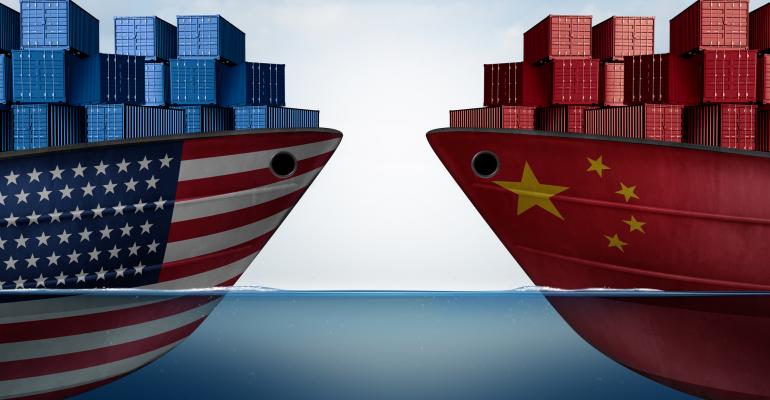China to 'immediately' retaliate against tariffs
June 16, 2018 | Expert Insights

Beijing has announced retaliatory measures after the US imposed fresh tariffs on Chinese technology products. Beijing announced tariffs on a $34 billion list of American goods. These measures could trigger a larger trade war.
Background
The United States has a history of tariffs dating back to the 1700s. In 2002, tariffs imposed by President Bush were thought to have cost the country 200,000 manufacturing jobs. They were lifted a mere 21 months after their imposition. In 2009, Obama imposed a 35% tariff on Chinese tyres after lobbying from American companies. This reportedly saved over 1000 jobs. However, some studies have shown that the tariff cost the country $2 billion in total, including a retaliatory ban on American chicken parts by China.
President Trump is known to have a protectionist outlook on trade. On the campaign trail, he promised tariffs against countries such as China, with whom the US has a $337 billion trade surplus. He has blamed China for loss of jobs. He also criticised “bad” trade deals and “unfair trade practices” against America. He said that other countries were "dumping vast amounts of steel all over the United States, which essentially is killing our steelworkers and steel companies”.
In recent months, experts have begun sounding the alarm about an impending trade war between the US and China, the two largest economies in the world. These fears heightened in March, when President Trump announced global import tariffs of 25% on steel and 10% on aluminium. The President cited “national security” in order to circumvent WTO commitments. Since then, tensions have escalated. The US has imposed tariffs worth over $150 billion; Beijing responded with $50 billion worth of tariffs.
During trade talks in Beijing this May, US officials reportedly called for China to cut the trade deficit by $200 billion. However, a later round of trade talks that ended on a positive note, led people to believe that tensions would de-escalate. Treasury Secretary Steve Mnuchin stated that the two nations would be putting the trade war on hold. China agreed to increase its imports of US goods and cut the trade deficit, and President Trump lifted sanctions on ZTE.
Analysis
China's Commerce Ministry announced tariffs on US goods as the trade dispute between China and the United Stated escalates. The tariffs include import duties on a $34 billion (€29 billion) list of American goods, which include soybeans, electric cars, orange juice, whisky, salmon, and cigars. The latest list specifically targets products that benefit from China's industrial subsidies, including the "Made in China 2025" technology plan.
The measures are expected to come into effect on July 6, which is the same day the US tariffs on Chinese goods will be implemented, with an additional $16 million to be imposed later. The Chinese government said it was responding "in equal scale" to US President Donald Trump's tariffs on Chinese imports. "The Chinese side doesn't want to fight a trade war, but facing the shortsightedness of the US side, China has to fight back strongly," a Commerce Ministry statement said. The two nations have been trading tariffs and threats of tariffs for a few months now.
US President Donald Trump announced that the US would impose 25% tariffs on Chinese goods worth $50 billion from July 6, reiterating his pledge to shut down ‘unfair trade practices’ by China. "The United States can no longer tolerate losing our technology and intellectual property through unfair economic practices," he said. "We have the great brain power in Silicon Valley, and China — and others — steal those secrets," Trump stated. "We are going to protect those secrets, those are crown jewels for this country."
"China's government is aggressively working to undermine America's high-tech industries and our economic leadership through unfair trade practices and industrial policies like 'Made in China 2025,'" US Trade Representative Robert Lighthizer said in a statement.
Chinese foreign ministry spokesman Geng Shuang said that the Chinese government had created its own list of $50 billion worth of US products that would face retaliatory tariffs if Washington raised the stakes. The new list comprises beef and soy beans, which are likely to hurt US agriculture in rural areas. China "has no choice but to strongly oppose this, due to the United States' myopic behavior that will harm both parties," Beijing's Commerce Ministry said in a statement.
Assessment
Our assessment is that this presents yet another threat to the tenuous truce called by US and China on the ongoing trade conflict. China is responding in equal scale to Trump's tariff rise on Chinese goods, in a conflict over China's estimated $336bn trade surplus and technology policy. By implementing tariffs, we believe prices will rise across industries hurting both producers and consumers. We also believe that China may call on other nations to take collective action against the US's tariff regime.
Read more: Trump Tariffs 2: The Reckoning








Comments